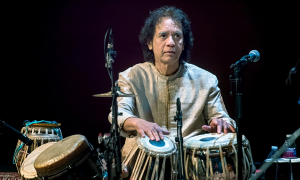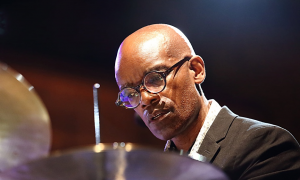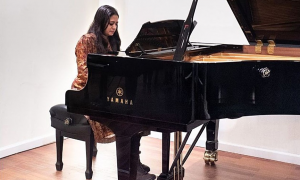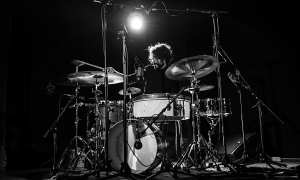Home » Jazz Articles » Under the Radar » Jazz in the Time of Pandemic
Jazz in the Time of Pandemic

Even if the world changes after this pandemic, and it will change, we need to keep the jazz community together without losing our passion and dedication.
—Roberto Magris
New York venues such as Birdland, Dizzy's Place, and the widely franchised Blue Note Jazz Club have the means to endure a shutdown for an extended period. But smaller clubs often have the same cash-flow issues as workers living from paycheck to paycheck. A recent Goldman Sachs survey indicated that more than half of all small businesses—typically defined as those with less than fifty employees—could not survive a shutdown of over three months. Distributing small business loans and individual support payments and the procedures for dispersal are shrouded in confusion and uncertainty. According to an April 3, 2020, Gothamist report on NPR, all sales of recorded music are down since the start of non-essential business closures. Even streaming services are down eight percent.
A life in jazz has never been easy and the coronavirus will test the resilience of even the most popular and profitable music genres; all the arts now function in seclusion. The disease has presented unimaginable challenges with few historic benchmarks and no easy solutions. Only those on the front line can convey what it feels like to be living in this time, so I contacted members of the community in two epicenters of the pandemic: Italy and the U.S.: musicians Roberto Magris, Matthew Shipp, Frank Lacy, Allen Lowe, and Gerry Malkin, and club owner Drew Claxton graciously gave their time and perceptions for this story.
Perspectives: One Club
The BeanRunner Café has been one of the more intimate settings for jazz in the New York metro area for the past decade. A little more than a half-hour north of Manhattan, it is co-owned by Drew Claxton and her partner, Ted Bitter. Claxton is not a typical club owner. She was born in Libya, and at eight, moved to the city of Peekskill, NY where The BeanRunner Café is on South Division Street. She served in the U.S. Air Force, earned a Master's degree in economics from NYU, and served as Deputy Mayor of Peekskill. Her advocacy for the city—an artistic hub in Northern Westchester County—runs deep. She served on Peekskill's Historical Preservation Advisory Board for eight years and was a member of the county's Environmental Management Council.I asked Ms. Claxton how she and Ted Bitter reacted to the reality of closing the BeanRunner Café, suddenly, and indefinitely.
Drew Claxton: "Our first thought was 'what about the shows that we had booked and what are the musicians going to do?' We knew we had to cancel the shows but felt terrible about it. Of course, all of the musicians understood, but we worried about how they are going to make it through this, as performing, and performing to audiences, is their life and livelihood. We also went through a sort of grieving period, as over the last 12 years we had built a real community of live music lovers, many who had become like family and we didn't know when, or if, we would see them again." Claxton adds BeanRunner Café has a Facebook page and they are developing an Instagram page where they will post clips of shows performed at the venue over the past ten years.
In times of crisis, the arts have attempted to bring understanding to incomprehensible events. It is conceivable that the coronavirus pandemic could trigger a similar response though it may be a long time before we know that.
DC: "Music and art have kept people together through the hardest times. I (Ted) post a different Reggae song every day and the response that I get shows me that this music touches people. We see and listen to many jazz musicians as they post themselves playing and some have figured out how to play together virtually and provide us with performances that are amazing. But we also know that a number of our jazz elders have succumbed to the Coronavirus, creating a vacuum that will need to be filled. But ultimately, we do believe that light, great music, and art, will come out of this darkness, and we look forward to hearing and seeing it."
I asked if the government's promised financial aid will help support the BeanRunner Café.
DC: "The government's stimulus package will help us to stay open, as a take-out café, for the next few months, and so help us to be in a position to restart a full-service cafe, assuming the pandemic ends in the next two months. This will put us in the same position as we were in when we first opened 12 years ago, at which time we weren't doing shows. As we are outside of New York City, and a small venue already with limited resources, it took years and a lot of word of mouth to build an audience for the amazing musicians that come to perform at the BeanRunner. It also took a change in culture for people up here to accept that they had to pay a cover (100% of which went to the musicians) in order to see a show. That kind of thing was simply not done in this area at that time. We can reach out to our regulars to welcome them back, but I expect that people will continue to be concerned for some time about sitting in close quarters for shows and it will take time for the economy to fully recover so that people have the disposable income to come out to shows." "We would like to see support systems for jazz music and jazz musicians get more fully developed. Fans are in need of music, musicians are in need of livelihoods, and venues, when reopened will need both. There must be a way that we can support each other during this time."
Perspectives: The Artists
Italian pianist/composer Roberto Magris a native of Trieste, Italy, a city influenced by Latin, Slavic, and Germanic cultures. On the western border of Slovenia, it was once part of the Austro/Hungarian empire. The multicultural inspirations of Magris' home city are reflected in the broad palette that defines his work. Now based in New York, the coronavirus lockdown has found him sequestered in his native country when he would have been promoting his just-released album Suite! (JMood, 2019). Magris performs in formations from solo to large ensembles and has toured in over forty countries.The influential pianist/composer/improviser Matthew Shipp needs little introduction as a musical force; he has sold out performances at Carnegie Hall, small downtown clubs and venues throughout Europe. His business acumen adds a deeper level of understanding in the present crisis. Shipp, who attended the New England Conservatory, recorded for Thirsty Ear Recordings also serving as an artistic director and producer.
Saxophonist/guitarist Allen Lowe has recorded with Shipp, Roswell Rudd, Marc Ribot, David Murray, Doc Cheatham, Loren Schoenberg, Julius Hemphill, Don Byron, Hamiet Bluiett, Kevin Ray, and many others. Like Shipp, his insights extend beyond composing, recording, and playing. A noted historian, he has authored several books including American Pop From Minstrel to Mojo: On Record, 1890-1956 (Cadence Jazz Books, 1997) and That Devilin' Tune: A Jazz History, 1900-1950 (Music and Arts Publications of America, 2001.) The latter book has been used in courses at Harvard and Yale. Lowe had been the Director of Jazz New Haven, managing their jazz festival for several years; he brought in top talent such as Tony Williams, Max Roach, Jaki Byard, Tito Puente, Freddie Hubbard, Joe Lovano, Randy Brecker, and others.
Houston native Ku-Umba Frank Lacy grew up in a musical family. His father played guitar with Illinois Jacquet, Eddie "Cleanhead" Vinson and others; his mother was a gospel singer. By the time Lacy was in his mid-teens he was playing piano, trumpet, tuba, euphonium, and trombone, the instrument he is most associated with. He regularly adds vocals in his performances. In the 1970s he earned a degree in physics from Texas Southern University but chose a life in music. He studied composition at Berklee then transferred to Rutgers University. He played with Lester Bowie, Henry Threadgill, David Murray and McCoy Tyner and recorded with Carla Bley's Big Band and joined Art Blakey's Jazz Messengers where he was music director. He began recording as a leader in 1991 but is best known for his two decades with the Mingus Big Band. Lacy is a member of the Smalls Legacy Band, 1032K with bassist Kevin Ray and drummer Andrew Drury.
For saxophonist Gerry Malkin, music has been about performing and instructing for the past three decades. A graduate of the University of Bridgeport, he was mentored by Dave Liebman, Frank Foster and Bob Berg. Malkin has performed with Tito Puente, Lew Soloff, Adam Nussbaum, and other well-known jazz artists. The early part of his career was linked with several famous Motown acts including The Temptations and The Four Tops. Malkin leads a quartet of top musicians whose recording credentials include projects with John Abercrombie, Marc Copeland, Woody Herman, and Dave Liebman. Among the artists who have appeared with Malkin's group is trumpeter Ingrid Jensen.
I asked the musicians what their initial thoughts were when it became clear traditional venues would be shuttered indefinitely.
Roberto Magris: "I thought that 'things wouldn't be as they used to be' for a long time. I have a daughter living in Madrid, where the situation is like in Italy, and a son living in Finland and being in touch with them I immediately got to know that the changing would be European, if not planetary... Many jazz venues were in financial troubles even before the pandemic... hard to think that they could open again after this story ends. Hard times for artists who need a live audience..."
Matthew Shipp: "My initial thoughts were wow—if you are living tour to tour this is going to be really difficult. I had got lucky with some publishing for music that was used for something sort of big right before this hit and a few other projects that ended right before this really hit plus I've always been a big saver so it was not pure desperation—but the thought of income being suspended for 3-4 months is a mind warp to say the least."
Frank Lacy: "That it probably wasn't that serious, and would be over by the end of March or Mid-April."
Allen Lowe: "That once they [clubs] reopen there will be a long line to get back in, and I'll never work again."
Gerry Malkin: "This is like nothing anyone of this generation has ever seen. It is sad to realize that for a period of time we would lose the joyful interaction of the musicians we play with and the connection to an audience that enjoys what we do."
World War I, the Spanish Flu Pandemic, and the Bolshevik Revolution all occurred at roughly the same time. What followed was an extraordinary burst of artistic creativity including the birth of modern jazz. Often, great things come out of major crisis and the arts and humanities have brought people together in those times. Could such a thing come out of this pandemic?
RM: "I don't think so, I'm sorry. Ideas, new ideas need people to spread and people need to meet other people, exchange their feelings, their humanity, in a physical way. I'm afraid that the social distancing will last also after the pandemic, people will be more cautious before going out to dinner, to theatre, to a concert, to a football match. People in the past centuries had no other alternative to re-start from the ruins and rebuild the society. Now we have another alternative: the virtual world. I think this situation will more and more shift the real life into a virtual life, virtual friends, virtual concerts, virtual picnics. Everybody on Skype, on FB, for a massive relationship of low quality. Low quality time. If the most important part of the social life will happen in the virtual world, I'm afraid we won't have a new kind of creativity for our souls but simply a gratification for our needs, musical needs included. Am I too negative? This was the trend also before, now staying at home and remaining aside will increase that trend and I can already see some new forms of advertising in the net to push us more and more in that direction...." "However, every period in the human history had its musical counterpart and jazz, in my opinion, was and still is the music of the industrialized world, music of the cities, the music of the social and political humanity. I think that jazz can hardly be the music of a virtual globalized world. I think that different is beautiful and this concept can hardly match to the concepts of globality and virtual world. Are we going to become jazz 'survivors'? I hope not."
MS: "Yes —I think there is a chance for a lot of people —really figuring out what is important and getting back to basics—from that will flow a lot—no one knows what all of this will look like when we come out of it so there will be a regeneration of some type and it will be a new world."
FL: "To be honest, seems to me that this Covid-19 has brought people together, even if they didn't want to. Musicians are actually calling me to talk...I've been getting so many texts that I already thought AI was here! But those periods in history were without the modern so-called niceties that we have today. Maybe if we didn't have all the technology we have today, there just might be more human interaction, which was happening much more back in the day. But from the times we live in, I think it could go either way...the possibility for an unprecedented paradigm shift to the positive, or a paradigm shift to the negative, depends on the will and heart of the artists, managers/club owners/agents/ festival producers/patrons/fans...but I say this...this profession has never been for the faint of heart!
AL: "I actually know the post-Russian revolution period burst of artistic expression well; unfortunately, it did not end well. But this...I don't think anything will change here. There will be lots of "jazz community talk" but everyone and everything will go back to business as usual."
GM: "This does allow for reflection and time to practice and create. Everyone reacts in their own personal manner."
Live music has an irreplaceable power that can't be duplicated in the virtual world. But given the present reality, how are these artists planning to use social media platforms to promote their music?
RM: "I've just decided to wait and see...The media platforms have filters and can be oriented in a way or in another. I can't imagine the rite of the music without people (physical people) around the fire. It's still tribal. Of course, I send email and I post on FB but that's just an alternative. I'd much more prefer to talk in person when it's possible. So, I'd expect to play in person too."
MS: "I have been talking to a couple people who are trying to organize on line concerts —I am expecting a couple things to jump off—other than that I have a few albums coming out and will be relying on the same sort of social media promotion of the CDs which will be available to order on line."
FL: "What do you mean by 'live' music? Bands playing music? DJ's? Electronica? I mean, acoustic music in America is already on the downslide, so this particular part of your question needs to be expounded upon. b) I love these terms like 'music with this irreplaceable power' and all but I feel that for jazz in America...not other types of music, just jazz, America talks copious amounts of rhetoric, and has been since I've been in the game...for jazz musicians, most of our work comes from the international world so much, for so long, that their livelihood ain't gonna get better until they can travel safely again...cats know where most of their money comes from, and America is behind...BIG TIME. c) As a student of physics, we know that the PRESENT is just an ever-changing, ever-moving, continuous convergence of the PAST, PRESENT, and FUTURE, so a conscious artist should know that...know your lessons from the past to, in the present, always prepare for the future of your career. d) As far as social platforms, at the end of the day, we need the fans to come out and support this music...behinds in seats, as Lester Bowie used to say...I mean how SOCIAL can you get?"
AL: "I am planning on plugging my old music; just to keep my name out there."
GM: "I'm not really involved in social media. Just go on to post gigs."
I asked if the artists felt that their government's response (Italy and/or the US) in terms of some safety net for people and businesses like the clubs, would be helpful for musicians trying to get through this pandemic?
RM: "I think that the Italian government was very prompt and good in the decisions they took for the population, in general terms. We are still in the middle of the pandemic with a terrible situation in the hospitals so it's too early to expect that they do something for the musical activities. Musicians are workers, in the society. So, we will surely receive a support but I don't think it will be a specific support. We need that the 'new' after-pandemic society will ask again for culture, music, theaters, festivals, exhibitions, libraries and that this can be supported by public funds, for the initial reprise at least. The biggest mistake we can do, in general terms, is not to catch this hard chance of the pandemic to turn into a more spiritual dimension in our lives, more oriented to pursue the spiritual, intellectual, cultural needs than the social and financial success, that it's still necessary, of course, but it cannot be an absolute masterplan for our life. We can focus more on the global family, including all the people and all the races, and on the necessity of elevating our thoughts and behaviours. Now we have some time to compare the worlds inside/outside and I think that music, jazz music, for the people who have this common sensibility, could help to concentrate on this."
MS: "Yes -the government money will be very helpful."
FL: "Yes, absolutely. But it would be better for all Americans if mortgages, rent, utility bills, loans were suspended...that would have been more helpful."
GM: "Not a fan of this administration and that is putting it mildly. Their initial response to the crisis was shameful at best. The stimulus package puts a Band-Aid on a major open wound."
Finally, what more would this group like to see from support systems, fans, other musicians?
RM: "Even if the world changes after this pandemic, and it will change, we need to keep the jazz community together without losing our passion and dedication. So, in this period, we especially need 'the press' to keep alive the flame and the focus on our music, while waiting for better times, with a special eye to the young generation, all over the world."
MS: "Well this is difficult on everyone—no one is spared some level of suffering from this in some way—so I don't really know what I would expect from anyone —no one anticipated this and it is all virgin land for us so [I] don't know what or how I could expect anything from anyone except for the government to be on top of it and to take care of the people given how severe this is."
FL: "Just more, more support at venues, and grants/loans...opportunities in this country to play and get paid decently...I'm tired of hearing rhetoric in America on how great jazz is, and in my 36 years in the game, the longest tour I've done in America was with Art Blakey for 2 weeks!...Look, I've travelled throughout the planet...jazz musicians know that America has been need to step up to support its indigenous art form for over 50-60 years...enough TALK...ACTION!
AL: "Nothing special; just that they don't go back to their previous, cliquish ways; which they will go back to."
< Previous
Déjà Vu: The Arista Recordings (197...
Comments
Tags
Under the Radar
Karl Ackermann
Wallace Roney
Bucky Pizzarelli
Manu Dibango
Ellis Marsalis
Roberto Magris
Matthew Shipp
Frank Lacy
Allen Lowe
Roswell Rudd
Marc Ribot
David Murray
Doc Cheatham
Loren Schoenberg
Julius Hemphill
Don Byron
Hamiet Bluiett
Kevin Ray
Tony Williams
Max Roach
Jaki Byard
Tito Puente
Freddie Hubbard
joe lovano
randy brecker
Illinois Jacquet
Eddie "Cleanhead" Vinson
Lester Bowie
Henry Threadgill
McCoy Tyner
carla bley
Art Blakey
Mingus Big Band
1032K
Andrew Drury
Dave Liebman
Frank Foster
Bob Berg
Lew Soloff
Adam Nussbaum
John Abercrombie
Marc Copeland
Woody Herman
Ingrid Jensen
For the Love of Jazz
 All About Jazz has been a pillar of jazz since 1995, championing it as an art form and, more importantly, supporting the musicians who create it. Our enduring commitment has made "AAJ" one of the most culturally important websites of its kind, read by hundreds of thousands of fans, musicians and industry figures every month.
All About Jazz has been a pillar of jazz since 1995, championing it as an art form and, more importantly, supporting the musicians who create it. Our enduring commitment has made "AAJ" one of the most culturally important websites of its kind, read by hundreds of thousands of fans, musicians and industry figures every month.






















